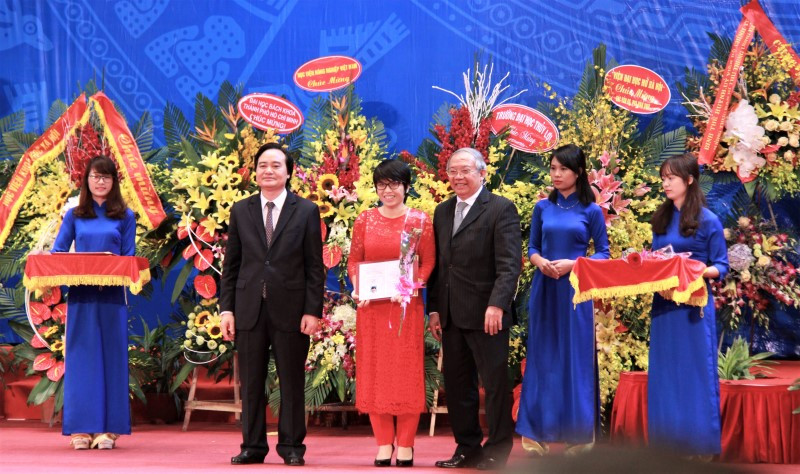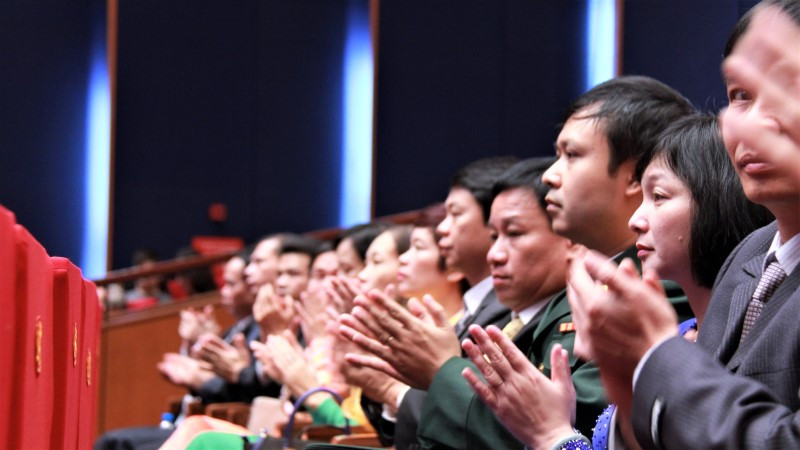The 3-level council model for examining and appointing professors and associate professors will be abolished.
Procedures for considering working hours to meet the standards for the titles of Professor and Associate Professor will only be carried out at two levels: the Basic Professorial Council and the State Professorial Council.
The industry and interdisciplinary professor councils will be "integrated", becoming a support body for the State Professor Council.
This is one of the notable points of the latest draft on regulations on standards, procedures for recognition of qualifications, appointment and dismissal of professors and associate professors, which is being consulted by the Government Office with relevant ministries, branches and units.
Specifically, in chapter 3 of the draft regulation "Procedures for considering recognition of qualifications and appointment to the title of Professor and Associate Professor", the consideration of qualifications is only divided into 2 levels: At the university education institution and at the State Council of Professors.
The procedures and requirements for consideration at all levels have also changed significantly compared to previous regulations.
 |
| Awarding certificates of meeting the standards of Professor and Associate Professor in 2016. Photo: Le Van. |
Accordingly, regarding the Council of Professors at higher education institutions, the draft stipulates: based on the requirements for the titles of Professor and Associate Professor in the present and future, higher education institutions shall establish themselves or cooperate with other higher education institutions to establish a Council of Professors at the grassroots level.
In case a university does not have enough professors or associate professors in related majors, it has the right to invite outside professors or associate professors.
At the same time, the activities of the Faculty Council mainly focus on reviewing the needs of personnel with the title of Professor and Associate Professor of the unit, procedures, and candidate profiles. The assessment of the scientific level of the candidate depends on the conditions of each school for consideration (not required).
Regarding the State Council of Professors, the draft stipulates: The Chairman of the State Council of Professors appoints members of the State Council of Professors, establishes and appoints members of the Council of Professors of the field and interdisciplinary fields who are scientists with expertise, prestige, and worthy representatives of the fields and interdisciplinary fields of science.
Every year, the President of the State Council of Professors can adjust and supplement members of the Council of Professors of the industry and interdisciplinary sectors to suit the development of scientific fields.
The Faculty Council of the Department and the Interdisciplinary Faculty Council are responsible for reviewing, assessing and evaluating the scientific and foreign language qualifications of the candidates recommended by the Faculty Council.
The State Council of Professors recognizes the qualifications for the title of Professor or Associate Professor for candidates after fully reviewing the application, based on scientific assessment from the Council of Professors of the industry and interdisciplinary fields.
Thus, the Council of Professors of the industry and interdisciplinary is no longer an independent level but a specialized department, assisting the State Council of Professors.
This is also clearly stated in Article 14 of the draft new regulations on the structure and procedures for establishing the State Council of Professors. Specifically, Clause 8 of this Article stipulates: "The State Council of Professors has a support unit, the Office, and the Professor Councils of the sectors and interdisciplinary sectors established by the Chairman of the State Council of Professors and regulating the organization of activities".
A new point in the operating principle of the professor councils is public and democratic discussion, voting or public balloting (ballots with signatures and full names of voters) at meetings to decide on issues related to the implementation of the council's tasks.
In previous regulations, professorial councils from the grassroots to the state level all decided by secret ballot.
In addition, the structure of the Basic Professors Council and the State Professors Council is also clearly defined in the new draft. In which, the Minister of Education and Training is the Chairman of the State Professors Council and the Vice Chairman is the Deputy Minister of Education and Training.
The term of the State Council of Professors is 5 years. Members of the State Council of Professors may serve no more than 2 consecutive terms.
Writing books is no longer a "hard" standard for professors and associate professors.
One of the new points of the draft being consulted this time is the regulation allowing GS candidates to replace the book writing standard with scientific articles published in prestigious international scientific journals (listed in ISI and Scopus).
Specifically, in Clause 5, Article 7 regulating the standards for the title of professor, the new draft adds the provision: "Candidates who do not have books for training will be compensated with the converted scientific work points of scientific articles of which the candidate is the main author corresponding to the points of the replaced books".
 |
| Writing books is no longer a "hard" standard for candidates for professors and associate professors. Photo: Le Van |
Scientific articles used to replace training textbooks are scientific articles published in prestigious international scientific journals after a decision is made to recognize the qualifications for the title of associate professor (for candidates applying for the title of professor) or after a decision to award a doctorate degree (for candidates applying for the title of associate professor).
Previously, writing a book was one of the "hard" standards that candidates for professors and associate professors had to meet when submitting their applications. This was considered inappropriate, especially for candidates working at research institutions.
In addition, the new draft also stipulates that, in addition to being proficient in any foreign language, candidates must also communicate professionally in English.
Other regulations on standards for the titles of professor and associate professor remain the same as the first draft published in early 2017.
Regarding the content of regulations on converted scientific work scores, the new draft proposes two options: Option 1 is to regulate converted scientific work scores into the articles of chapter 2 (Standards for the title of Professor, Associate Professor) and option 2 is to put it into an appendix, including a score conversion table and a list of prestigious international scientific journals.
In addition, the new draft also adjusts some regulations to suit candidates in some specific industries.
Specifically, the draft stipulates the conversion of scientific work scores for works of art and sports competitions that win national awards with a maximum of 1.5 points and international awards with a maximum of 2.0 points.
The draft also does not specify the subjects for appointing professors and associate professors as permanent lecturers in order to create conditions for higher education institutions to attract talented lecturers to positions in charge of training work at the school.
The appointment of the titles of Professor and Associate Professor at higher education institutions will be the responsibility of the principal to specifically regulate the structure of positions, quantity, standards, and conditions for appointment of the titles of Professor and Associate Professor. This regulation, according to the Ministry of Education and Training, is to implement the university autonomy policy.
According to VNN

